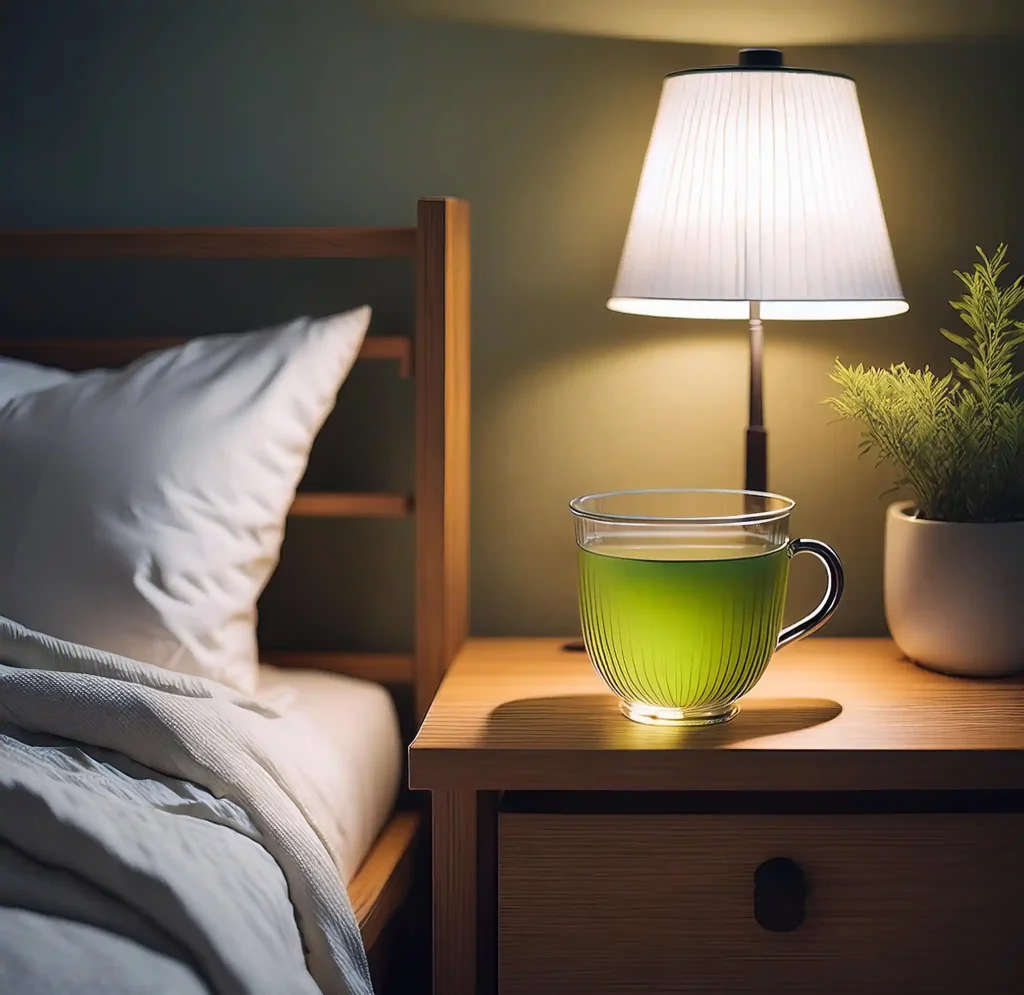Drinking green tea has become increasingly popular, and with good reason. It’s a beverage rich in antioxidants, with numerous health benefits. However, the question remains: should you drink green tea before bed? Opinions vary, and the decision depends on several factors, such as caffeine sensitivity, personal health goals, and individual responses to the drink. In this article, we’ll explore the science behind green tea, its potential benefits and drawbacks as a bedtime beverage, and offer personal insights and practical tips for anyone curious about adding green tea to their nightly routine.
The Health Benefits of Green Tea
Green tea is derived from the leaves of the Camellia sinensis plant, the same plant that produces black and oolong teas. The processing method used on the tea leaves makes a difference. Green tea undergoes minimal oxidation, which preserves its natural antioxidants, such as catechins, flavonoids, and polyphenols.
1. Rich in Antioxidants
Green tea is famous for its high concentration of antioxidants, particularly epigallocatechin gallate (EGCG). This compound helps neutralize free radicals, which can prevent oxidative stress and inflammation. Antioxidants are also linked to reduced risks of chronic diseases such as cancer, heart disease, and diabetes.
2. Aids Weight Loss
One of the most well-known benefits of green tea is its potential to assist with weight management. Studies suggest that green tea can enhance fat oxidation and improve metabolic rates, which can contribute to weight loss. Combined with a balanced diet and regular exercise, green tea can be an effective tool for maintaining or achieving a healthy weight.
3. Improves Brain Function
Although not as much as coffee, green tea does contain caffeine. The caffeine content in green tea provides a mild, sustained energy boost without the jitters often associated with coffee. This is complemented by L-theanine, an amino acid in green tea that promotes relaxation without drowsiness. Together, caffeine and L-theanine can improve brain function, enhance mood, and increase attention span.
4. Supports Heart Health
Green tea use on a regular basis has been linked to better cardiovascular health. The antioxidants in green tea can help reduce LDL cholesterol (often referred to as “bad” cholesterol) and triglycerides, thereby improving blood circulation and reducing the risk of heart disease.
5. Promotes Longevity
Due to its protective effects against various diseases and its role in reducing inflammation, green tea is believed to promote longevity. Actually, it has been discovered via a number of demographic studies that people who frequently consume green tea may live longer than those who don’t.
The Possible Negative Effects of Having Green Tea Right Before Bed
While green tea is undeniably a healthful beverage, its suitability as a bedtime drink is subject to debate. Below are some of the potential drawbacks to consider before sipping green tea at night.
1. Caffeine Content
Even though green tea contains less caffeine than coffee, it still has enough caffeine to potentially disrupt sleep, particularly for those who are caffeine-sensitive. The average cup of green tea contains around 30-50 milligrams of caffeine, depending on the brewing time and tea variety. While this may not seem like much compared to coffee, it’s important to remember that even a small amount of caffeine can interfere with the body’s ability to fall asleep and stay asleep.
As someone with moderate caffeine sensitivity, I’ve found that green tea in the late afternoon sometimes leaves me feeling a little too alert for a restful night. There have been instances when I sipped green tea after dinner, only to find myself tossing and turning hours later, mind racing. The mild stimulation, although not overwhelming, can prolong the time it takes to wind down and drift off.
For those who are particularly sensitive to caffeine, even this small amount might lead to difficulty falling asleep. In such cases, it might be best to enjoy green tea earlier in the day or opt for a caffeine-free alternative in the evening.
2. Frequent Urination
Green tea is a natural diuretic, meaning it increases the amount of urine your body produces. This effect may be beneficial during the day when you want to flush out toxins, but at night, it could lead to multiple trips to the bathroom. Interrupting your sleep with frequent urination is far from ideal if you’re aiming for a restful night.
I’ve personally experienced this downside of drinking green tea too late in the evening. Having that extra liquid in your system can have an effect, even though it might not be as extreme as downing a large glass of water. This is especially true if you are someone like me who finds it difficult to go asleep at night. If you struggle with sleep continuity, you might want to reconsider that evening cup.
3. Heartburn or Acid Reflux
Some individuals find that green tea, particularly when consumed on an empty stomach, can cause digestive discomfort. Green tea contains tannins, which can increase stomach acidity and potentially lead to heartburn or acid reflux. Drinking green tea before bed on an empty stomach may exacerbate these symptoms, making it harder to fall asleep comfortably.
While I’ve never experienced heartburn from green tea, I’ve noticed that it can feel a bit harsh if I drink it when I’m not in the mood for a hot beverage or if I drink it too quickly. If you have a sensitive stomach or are prone to acid reflux, green tea may not be the best choice for bedtime.
Should You Drink Green Tea Before Bed?
The answer to whether or not green tea is a good bedtime drink really depends on your personal tolerance to caffeine and your sleep needs. While green tea offers many health benefits, these should be weighed against potential sleep disruptions and discomforts, especially if consumed too late in the evening.
1. Caffeine-Sensitive Individuals
Green tea probably is not a smart idea right before bed if you are sensitive to caffeine. Even the relatively low levels of caffeine in green tea could be enough to interfere with your sleep. Consider having green tea earlier in the day, perhaps in the morning or early afternoon, when you can still enjoy its benefits without the risk of disrupting your sleep.
Alternatively, you might explore decaffeinated green tea options. Decaffeinated varieties are a preferable choice for bedtime consumption because they contain less caffeine while still retaining the majority of the healthy antioxidants.
2. Building a Bedtime Routine
Green tea could make a relaxing evening ritual for people who are not caffeine-sensitive. Because of its modest caffeine content, you can be alert enough to wind down with a book or journal without feeling overly alert—especially if you drink it at least an hour or two before bed.
In my experience, timing is key. When I drink green tea in the late afternoon or early evening, I feel calm but not wired. However, if I push it too close to bedtime, that calm can turn into wakefulness. I’ve learned that my ideal time for drinking green tea is around 7 PM, which gives me a few hours to enjoy its calming effects before the caffeine wears off.
Pairing green tea with other relaxing activities, such as meditation or gentle yoga, can enhance its calming effects and help signal to your body that it’s time to unwind.
3. Alternatives for Nighttime
If the caffeine in green tea is a concern, or if you find that it leads to frequent urination or digestive discomfort, consider trying herbal teas instead. Herbal teas, such as chamomile, valerian root, or lavender, are naturally caffeine-free and are often touted for their calming properties, making them ideal choices for a bedtime drink.
Personally, I alternate between green tea and chamomile tea, depending on how I feel. On nights when I’m seeking something more relaxing and sleep-inducing, I reach for chamomile. Its subtle flowery flavor is reassuring and helps induce calm. However, when I want something light and slightly energizing to carry me through a quiet evening of reading or thinking, green tea is my go-to option.
Practical Tips for Drinking Green Tea Before Bed
If you decide to try drinking green tea in the evening, here are a few tips to optimize your experience:
1. Choose a Low-Caffeine Variety
Certain varieties of green tea are higher in caffeine than others. For example, matcha, a powdered green tea, typically has higher caffeine content compared to other green teas. If you’re looking to reduce caffeine intake at night, opt for a variety like sencha or bancha, which have lower caffeine levels.
Additionally, consider switching to decaffeinated green tea. Although decaffeination reduces some of the antioxidants, it still retains a majority of the health benefits without the sleep-disrupting effects of caffeine.
2. Brew it Correctly
How you brew your green tea can impact both the flavor and the caffeine content. Steeping your tea for a shorter time (around 1-2 minutes) will extract less caffeine than letting it brew for longer. The water temperature also matters—avoid boiling water, as it can make the tea taste bitter and overpower the delicate flavors. Aim for water that’s around 160-180°F (70-80°C) for the best taste and experience.
3. Pair with Relaxing Activities
Incorporate green tea into a calming nighttime ritual. Pair it with activities like reading, stretching, or meditating to enhance the relaxing effects of L-theanine, an amino acid in green tea known for promoting calmness and mental clarity.
4. Watch Your Overall Fluid Intake
To prevent frequent nighttime bathroom trips, be mindful of how much green tea you drink and how late you drink it. A small cup of green tea after dinner may not cause issues, but larger amounts consumed closer to bedtime could lead to disturbances. If you find that even a small amount affects your sleep, consider cutting back or switching to a non-diuretic herbal tea at night.
Is Green Tea Before Bed a Good Idea?
In conclusion, green tea before bed can be a good idea—depending on your individual circumstances. Green tea should ideally be had earlier in the day for people who are sensitive to caffeine in order to prevent sleep disturbances. However, for those who are less affected by caffeine, green tea can offer relaxation and health benefits as part of a calming bedtime routine. By choosing the right variety, timing your consumption wisely, and being mindful of your body’s signals, you can enjoy green tea’s many benefits without sacrificing your sleep.
Based on my experience, I have discovered that although green tea is a fantastic beverage for general health, amount and timing are crucial, particularly if you want to avoid waking up in the middle of the night. Whether you decide to embrace green tea in your evening routine or opt for a caffeine-free alternative, finding the right balance is key to enjoying restful nights and reaping the benefits of this ancient beverage.

